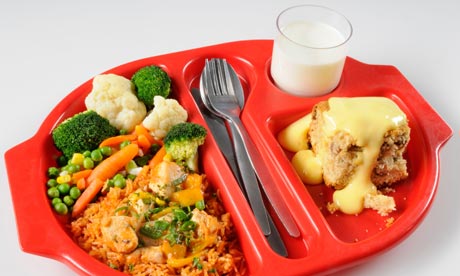
Packed lunches could be banned and pupils barred from leaving school during breaks to buy junk food under a government plan to increase the take-up of school meals, which is to be announced on Friday.
The plan, drawn up by John Vincent and Henry Dimbleby, the founders of the food company Leon, aims to tackle the poor public image of school meals.
The report, which suggests a link between nutrition and academic performance, highlights that parents currently spend almost £1bn on packed lunches but only 1% of them meet nutritional standards. In contrast, scientific studies show most school meals are a healthier option.
The report suggests a range of measures for headteachers to increase take-up of school meals. They include banning unhealthy packed lunches full of sugary drinks, crisps and sweets, or even a total ban on all packed lunches.
Children could also be barred from leaving school premises at break time, preventing them from buying unhealthy food, such as takeaways. But schools should also make their meals more exciting and ensure unhealthy snacks are not served during mid-morning breaks.
The plan also recommends subsidising school lunches for children in the first term of primary and secondary school or discounts for parents with several children.
It also suggests introducing cashless payments to reduce long queues and prevent children who receive free school meals from being stigmatised. Teachers are also recommended to eat with pupils in the dining hall.
Cooking should also be part of the curriculum until children are 14, and schools could also offer lessons to parents and their children after school.
The plans include £11.8m from the Department for Education to help increase the take-up of meals, and £3.15m to provide healthy breakfasts for children who arrive at school hungry.
Two London boroughs will be chosen as pilot schemes to demonstrate how better school food can improve health and educational performance.
The plan comes after Michael Gove, the education secretary, was accused by the Labour-appointed TV chef Jamie Oliver of imperilling children's health and educational prospects by letting the rapidly growing number of academies and free schools opt out of the standards.
Almost a fifth of UK children are obese by the time they leave primary school. The situation is even worse in London, with almost a quarter of children starting primary school and over a third of year six children overweight or obese.
At present, the majority of pupils – 57% – take a packed lunch or buy food outside school. Currently school meals cost £140m in school subsidies and their provision in England will only break even if average take-up rises above 50%.
Separately, the Department of Health is due to publish its consultation on plain-packaged cigarettes. The department closed the consultation in August, and campaigners in favour of it were not expecting imminent legislation.
A bill to introduce such packaging, supported by the public health minister Anna Sourby did not feature in the Queen's speech, as ministers said more time was needed to study the impact of the ban introduced in Australia.

